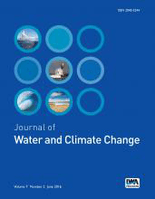
Journal of Water and Climate Change
Scope & Guideline
Innovating Strategies for Water Sustainability Amid Climate Change
Introduction
Aims and Scopes
- Water Resources Management:
Focuses on sustainable management practices for water resources in the context of climate change, addressing issues such as supply-demand dynamics, water quality, and hydrological modeling. - Climate Change Impact Assessment:
Investigates the effects of climate change on hydrology, including changes in precipitation patterns, streamflow, and water availability across various regions. - Hydrological Modeling and Simulation:
Utilizes advanced modeling techniques, including machine learning and statistical methods, to predict hydrological responses to climate variability and human interventions. - Integrated Approaches:
Promotes interdisciplinary research that integrates ecological, hydrological, and socio-economic perspectives to develop comprehensive strategies for water management. - Drought and Flood Risk Management:
Examines methodologies for assessing and mitigating the risks associated with droughts and floods, particularly under changing climatic conditions. - Ecosystem Services and Resilience:
Explores the relationship between water management practices and ecosystem health, focusing on enhancing resilience to climate-induced changes.
Trending and Emerging
- Machine Learning Applications:
An increasing number of studies are employing machine learning techniques for water quality prediction, flood forecasting, and hydrological modeling, showcasing the potential of AI in enhancing water resource management. - Climate Resilience Strategies:
There is a growing emphasis on developing strategies that enhance the resilience of water systems and communities against climate impacts, such as droughts and floods. - Integrated Water-Energy-Food Nexus:
Research exploring the interconnectedness of water, energy, and food systems is on the rise, reflecting the need for holistic approaches to sustainability. - Impact of Climate Variability on Ecosystems:
Emerging studies are increasingly focusing on how climate variability affects aquatic ecosystems, highlighting the necessity for integrated ecological assessments in water management. - Socio-Economic Implications of Water Management:
Research is increasingly addressing the socio-economic dimensions of water resource management, particularly in relation to climate change adaptation and community resilience.
Declining or Waning
- Traditional Water Supply Systems:
Research on conventional water supply systems has decreased as interest shifts towards sustainable and integrated approaches that encompass climate resilience and adaptive management. - Static Hydrological Models:
The reliance on traditional static models for hydrological assessments is waning in favor of dynamic, data-driven models that incorporate real-time data and machine learning techniques. - Single-Factor Analyses:
Studies focusing solely on single factors affecting hydrology, such as land use or climate alone, are becoming less common as multi-factorial approaches gain traction.
Similar Journals
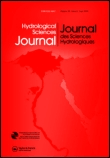
Hydrological Sciences Journal
Pioneering research in the realm of water management.Hydrological Sciences Journal, published by Taylor & Francis Ltd, is a leading peer-reviewed publication dedicated to advancing the field of hydrology, spanning topics from water management to climate impacts on hydrological systems. With an impressive impact factor and a noted Q1 category ranking in Water Science and Technology, the journal occupies a pivotal role in the academic landscape, facilitating high-quality research dissemination since its inception in 1982. The journal is indexed in Scopus, holding a commendable rank of #48 out of 261 in the Environmental Science category, placing it in the 81st percentile among its peers. Although it does not offer Open Access options, the journal ensures extensive reach and readership through institutional subscriptions. As it converges toward its milestone of 2024, the Hydrological Sciences Journal remains an indispensable resource for researchers, professionals, and students eager to explore the latest advancements and methodologies in hydrological research.

Journal of Hydrology X
Innovating Hydrology: Bridging Research and PracticeJournal of Hydrology X, a premier publication in the field of water science and technology, is published by ELSEVIER from the Netherlands. Since transitioning to Open Access in 2018, this journal has provided researchers, professionals, and students unrestricted access to vital research findings and advancements in hydrology. With an impressive Q1 category ranking in 2023, and a Scopus ranking of #41 out of 261 in Environmental Science, it stands at the forefront of water-related studies, showcasing high-quality, peer-reviewed articles that drive innovation and collaboration. The journal focuses on integrative approaches from 2019 to 2024, catering to a diverse audience eager to advance the understanding and management of freshwater resources globally. Its commitment to disseminating impactful research makes it an essential resource for anyone working in or studying this vital field.
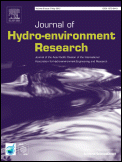
Journal of Hydro-environment Research
Unveiling interdisciplinary insights for effective water management.The Journal of Hydro-environment Research, published by Elsevier, serves as a leading platform for advancing knowledge in the fields of civil and structural engineering, environmental chemistry, and water science. With a robust impact factor reflecting its Q2 category ranking across various disciplines—including Environmental Engineering and Management, Monitoring, Policy and Law—it emphasizes high-quality research that addresses pressing environmental challenges. Embracing a global perspective, the journal explores interdisciplinary approaches to water and environmental management, thus empowering researchers and professionals to innovate and implement effective solutions. Since its inception in 2007, the journal has continually evolved, with its scope expanding into emerging areas pertinent to water science and technology. The journal is indexed in esteemed databases, ensuring wide dissemination and accessibility of published works, although it does not currently operate on an open access model. Addressing the intricate interplay between human activities and water resources, the Journal of Hydro-environment Research is quintessential for those dedicated to fostering sustainable practices and enhancing our understanding of hydro-environmental systems.
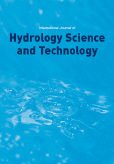
International Journal of Hydrology Science and Technology
Exploring Innovative Solutions in Water ScienceThe International Journal of Hydrology Science and Technology, published by InderScience Enterprises Ltd, is a distinguished platform dedicated to advancing knowledge in the field of hydrology, environmental engineering, and water science. With an ISSN of 2042-7808 and an E-ISSN of 2042-7816, this journal, established in 2011 and continuing through 2024, serves as an essential resource for researchers, professionals, and students alike. Despite being categorized in the Q3 quartile across multiple disciplines including Earth and Planetary Sciences, Environmental Engineering, Waste Management and Disposal, and Water Science and Technology, the journal maintains a reputation for contributing significant findings that impact both theory and practical applications in addressing hydrological challenges. Currently unavailable through Open Access options, the journal remains committed to disseminating valuable research that informs sustainable practices in water resource management. The editorial team encourages submissions that explore innovative strategies and methodologies while fostering interdisciplinary discussions, making this journal a pivotal player in shaping the future of hydrological science.

JOURNAL OF THE AMERICAN WATER RESOURCES ASSOCIATION
Fostering collaboration for sustainable water resource solutions.The JOURNAL OF THE AMERICAN WATER RESOURCES ASSOCIATION, published by Wiley, is a premier platform dedicated to advancing the field of water resource management and research. With an ISSN of 1093-474X and an impressive Q1 ranking in multiple categories, including Earth-Surface Processes, Ecology, and Water Science and Technology, this journal serves as a vital resource for professionals, researchers, and students alike. Established in 1967 and set to converge through 2024, it has consistently published cutting-edge research that influences policy and practice in water resource management. The journal's open access option enhances its reach, ensuring that critical findings are accessible to a wider audience. The Scopus rankings further underscore its impact, placing it in the top quartile within its fields, highlighting its importance in shaping scholarly discourse. As a significant contributor to the understanding and management of freshwater systems, the journal offers a crucial means for sharing insights and fostering collaboration in the vital realm of water resources.

Journal of Water Management Modeling
Advancing Knowledge in Civil Engineering and Water TechnologyThe Journal of Water Management Modeling, published by COMPUTATIONAL HYDRAULICS INT, stands as a pivotal resource in the fields of Civil and Structural Engineering, Geography, Planning and Development, and Water Science and Technology. With an ISSN of 2292-6062, this Canadian-based journal has earned its reputation by exploring innovative modeling approaches to enhance water management, crucial in addressing today's environmental challenges. Despite its current Q3 status in Civil and Structural Engineering and Water Science categories, alongside a respectable Q2 rank in Geography, the journal is committed to advancing knowledge and fostering collaboration among researchers, practitioners, and students passionate about the sustainable management of water resources. The journal operates on an open-access model, ensuring research is readily available to a broad audience, and has converged its editorial focus from 2018 to 2024, continuously adapting to emerging trends and technologies within the discipline. As a part of the global conversation regarding effective water management, it plays a vital role in informing policies and practices that impact communities and ecosystems alike.

Water Practice and Technology
Transforming Water Science into Practical SolutionsWater Practice and Technology is a distinguished open-access journal published by IWA PUBLISHING, dedicated to disseminating cutting-edge research and practical insights within the field of water science and technology. With an E-ISSN of 1751-231X, the journal has been at the forefront of sharing knowledge since its inception in 2011 and has transitioned to open access in 2021, providing unrestricted access to high-quality research articles. Based in the United Kingdom, this journal plays a vital role in advancing the understanding of water resource management, treatment technologies, and environmental sustainability. As of 2023, it is categorized in the Q3 quartile for Water Science and Technology with a Scopus rank of #157/261, placing it in the 40th percentile among its peers. Researchers, professionals, and students alike will find the journal a valuable resource for the latest trends, innovations, and practical applications in the water sector, facilitating a collaborative approach towards addressing global water challenges.

Water Resources
Pioneering interdisciplinary research for water resilience.Water Resources, a prominent journal published by MAIK NAUKA/INTERPERIODICA/SPRINGER, focuses on the critical and evolving field of water science and technology. Established in 1976 and with a long-standing commitment to advancing knowledge, this journal explores interdisciplinary research that addresses the challenges surrounding water resource management, quality, and sustainability. With an impact factor positioned within the Q3 category of its field, it holds a notable Scopus rank (#181/261) in Environmental Science, emphasizing its role in driving scholarly discourse. While currently not open access, Water Resources provides vital insights for researchers, professionals, and students, making it an essential resource for those seeking to innovate and implement effective water management solutions. To stay ahead in a domain that is increasingly paramount to global sustainability efforts, consider engaging with the latest research published in this vital journal.
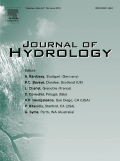
Journal of Hydrology
Innovating Solutions for Global Water ChallengesThe Journal of Hydrology, published by ELSEVIER, stands as a premier outlet for scholarly research in the field of water science and technology. With an impactful history dating back to 1949 and a convergence period extending to 2024, this journal has consistently provided a platform for cutting-edge research that shapes our understanding of hydrological processes and their implications. Located in the Netherlands, its commitment to excellence is underscored by its impressive Scopus rank of 15 out of 261 in the Environmental Science category, placing it in the 94th percentile overall, and achieving a prestigious Q1 category allocation for 2023. While the journal does not currently offer open access options, it remains an invaluable resource for researchers, professionals, and students seeking to deepen their expertise in hydrology. The rigorous peer-review process ensures the publication of high-quality manuscripts that contribute significantly to the advancement of knowledge in this critical domain.

Tecnologia y Ciencias del Agua
Connecting research and practice in sustainable engineering.Tecnologia y Ciencias del Agua is a dynamic and innovative open access journal published by the Instituto Mexicano de Tecnología del Agua, dedicated to advancing knowledge in the fields of civil and structural engineering as well as water science and technology. Since its inception in 1930, the journal has provided a platform for interdisciplinary research and discussion, catering to an audience of researchers, professionals, and students interested in the management of water resources and sustainable engineering practices. With an ISSN of 0187-8336, and an E-ISSN of 2007-2422, this journal has converged its focus from 2010 through 2024, although it currently holds Q4 quartiles in its category as per the 2023 rankings, indicating its evolving role within the global landscape of academic publishing. Despite its emerging status, the journal's commitment to disseminating high-quality, peer-reviewed research on critical topics related to water management and engineering continues to enhance its relevance and appeal. The journal is based in Morelos, Mexico, contributing to the region's rich academic tradition while also engaging with a broader international audience through its extensive open access policy.